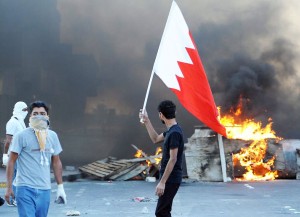Special to WorldTribune.com
ABU DHABI — For the first time, Bahrain has accused the United
States of fomenting a Shi’ite coup in the Gulf Cooperation Council kingdom.
Bahrain’s military chief said Washington was supporting numerous
non-governmental organizations assigned to generate unrest in the Sunni Arab
state. Field Marshal Khalifa Bin Ahmed Al Khalifa said the NGOs were trained
by Washington as well as an unidentified regional state.

“They are all operated, funded and trained by the United States and the Gulf country,” Khalifa told the Bahraini daily Al Ayam. “When we confronted officials from both countries with facts and information that we have gathered lately, they distanced themselves from them, claiming they were civil society organizations.”
In an interview published on Feb. 14, the first anniversary of the
Shi’ite revolt, Khalifa cited 22 NGOs that were allegedly working to
destabilize Manama. He said 19 of them were based in the United States and the remainder in the unidentified Gulf state.
Khalifa, believed to speak for the Bahraini leadership, said the NGOs recruited the international media against Manama and its treatment of the Shi’ite majority. The military commander said five countries and three “terrorist organizations” were involved.
“In their conspiracy against the regime in Bahrain, they provided large
funds and mobilized people from intelligence services, the military, the
media, the press, media agencies and satellite channels,” Khalifa said.
“They all conspired against Bahrain at a time when we were regretfully
unaware of what was happening. We did not expect such a carefully prepared
plot to target Bahrain.”
Khalifa said Bahrain, a neighbor and leading ally of Saudi Arabia,
foiled the U.S. plot and was trying to recover from the revolt. He said
seven countries sought to pressure Manama through restrictions on the export
of military and security systems, including equipment required by anti-riot
forces.
“They are the United States, Britain, France, Germany, Sweden,
Switzerland and Belgium,” Khalifa said. “The ban is still in place, but it
had no effect on Bahrain because we knew how to handle it and we diversified
the sources of our equipment.”
The Bahraini commander said he persuaded Britain to lift its military
embargo. He recalled a conversation with an unidentified British senior
officer in which Khalifa threatened to ban British military personnel as
well as warships and aircraft from the GCC state, which serves as the
headquarters for the U.S. Navy’s Fifth Fleet.
“I told him that we would impose a ban on dealing with British planes,
ships and military personnel in Bahrain if the ban on Bahrain was not lifted
within two weeks,” Khalifa said. “We do not need to import anything from
them, but it is a matter of principle.”
Khalifa warned that the Western pressure on Bahrain threatened all GCC
states. He said the United States and other NATO states were unreliable
military suppliers and could be replaced by such countries as China and
Russia.
“The crisis we have lived has taught us many things, and we have to be
aware that these countries are unreliable even though we import all our
weapons from them,” Khalifa said. “The world is wide open today and there
are many countries, such as Russia and China that have good weapons that can
replace those from other countries.”
Khalifa said all of the NGOs have been neutralized and no longer capable
of mobilizing support in Bahrain. But he acknowledged the prospect of
renewed Shi’ite revolt, saying Manama as well as the other GCC states were
ready to respond.
“If need be, the National Guard is fully ready and is thoroughly
trained,” Khalifa said. “If the problem persists, we are ready and so are
our brothers in the Gulf Cooperation Council to deal with any external
threats.”

You must be logged in to post a comment Login